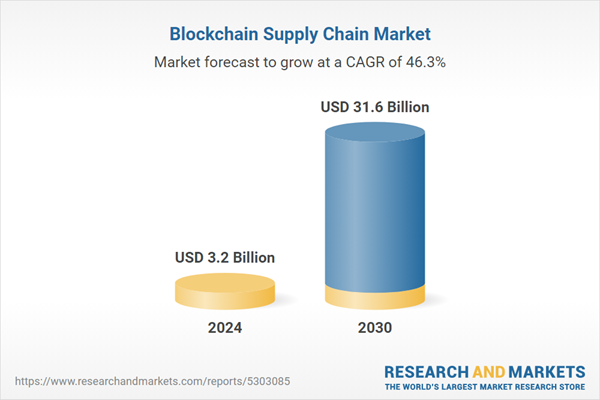Global Blockchain in Supply Chain Market - Key Trends & Drivers Summarized
How is Blockchain Transforming the Supply Chain Industry?
Blockchain technology is revolutionizing the supply chain industry by providing unprecedented levels of transparency, efficiency, and security throughout the entire supply chain process. Traditional supply chains are often fragmented and inefficient, with multiple intermediaries, delays, and little to no visibility into product movement or provenance. Blockchain addresses these issues by creating a decentralized, immutable ledger where each transaction, product movement, and interaction is recorded in real-time. This enables companies to trace products from raw material sourcing to the end customer, ensuring transparency and accountability at every stage of the supply chain.With blockchain, supply chain participants - including suppliers, manufacturers, distributors, and retailers - can access real-time information about a product's location, condition, and movement. This increases efficiency by reducing delays, preventing errors, and enhancing inventory management. Moreover, blockchain's tamper-proof ledger ensures that data related to shipments, certifications, and contracts cannot be altered or manipulated, enhancing the integrity of supply chain operations. This is especially critical for industries such as pharmaceuticals, food and beverage, and electronics, where product safety and authenticity are paramount. By using blockchain, companies can ensure the legitimacy of their products, mitigate the risks of fraud, and meet growing consumer demands for transparency and ethical sourcing.
How Does Blockchain Improve Supply Chain Transparency and Traceability?
Blockchain's ability to enhance supply chain transparency and traceability is one of its most valuable contributions to the industry. In traditional supply chains, data is often siloed within different entities, making it difficult to trace products or identify bottlenecks. Blockchain eliminates these silos by providing a shared, decentralized platform where all participants can record and verify data in real-time. Every time a product moves through the supply chain, a new block is added to the blockchain, documenting the transaction. This creates a comprehensive, end-to-end record of the product's journey, from raw materials to final delivery.This level of traceability is particularly important in industries where product authenticity, safety, and ethical sourcing are critical. For example, in the food industry, blockchain enables retailers and consumers to verify the origin and safety of their products, helping to prevent food fraud and ensure compliance with safety regulations. In the pharmaceutical industry, blockchain helps combat counterfeit drugs by providing an unalterable record of each drug's production, packaging, and distribution. Similarly, in the fashion and luxury goods industries, blockchain can authenticate the provenance of high-value items, ensuring that consumers are purchasing genuine products. As consumers and regulators increasingly demand transparency and accountability, blockchain is becoming a key tool for supply chain management.
What Role Does Blockchain Play in Automating Supply Chain Processes?
Blockchain is also playing a crucial role in automating supply chain processes, particularly through the use of smart contracts. Traditional supply chains often rely on manual processes and paper-based documentation, which are prone to errors, delays, and inefficiencies. Blockchain's smart contracts automate these processes by executing predefined actions when certain conditions are met. For example, a smart contract can automatically trigger payments between a buyer and supplier once goods have been delivered and verified, eliminating the need for manual invoicing and reducing the risk of disputes.In addition to automating financial transactions, blockchain can automate other supply chain processes such as inventory management, procurement, and compliance. For instance, smart contracts can automatically reorder inventory when stock levels reach a certain threshold, ensuring that supply chains remain well-stocked without overordering. Blockchain also streamlines compliance by providing an auditable record of all transactions, certifications, and inspections, reducing the administrative burden associated with regulatory compliance. These automation capabilities not only enhance supply chain efficiency but also reduce costs and improve the accuracy of operations. As supply chains become more complex and global, blockchain's ability to automate and streamline processes is becoming increasingly valuable.
What Factors Are Driving the Growth of Blockchain in Supply Chain?
The growth in the blockchain in supply chain market is driven by several factors, including the increasing demand for transparency, the need for greater efficiency, and the rise of digital transformation across industries. As consumers and businesses demand more visibility into the products they purchase and use, blockchain's ability to provide an immutable, transparent record of product movements is gaining traction. This is particularly important in industries such as food and pharmaceuticals, where product safety and traceability are critical for regulatory compliance and consumer trust. Additionally, blockchain helps companies meet sustainability goals by providing verifiable data on the environmental and social impact of their supply chains.The drive toward operational efficiency is another key growth factor. Traditional supply chains are often plagued by delays, inefficiencies, and errors due to manual processes and fragmented data systems. Blockchain addresses these challenges by enabling real-time data sharing, automating processes through smart contracts, and reducing reliance on intermediaries. As companies look for ways to streamline their supply chain operations and reduce costs, blockchain is emerging as a powerful solution.
Technological advancements, including the integration of blockchain with IoT devices and artificial intelligence (AI), are further accelerating the adoption of blockchain in supply chain management. IoT devices can provide real-time data on product conditions, such as temperature and humidity, which is then recorded on the blockchain, ensuring the integrity of sensitive products. AI algorithms can analyze blockchain data to optimize supply chain performance, predict demand, and prevent disruptions. Finally, regulatory support and industry collaborations are helping to propel the blockchain supply chain market forward, as businesses, governments, and industry bodies recognize the technology's potential to improve supply chain transparency, security, and efficiency.
Report Scope
The report analyzes the Blockchain Supply Chain market, presented in terms of market value (US$ Thousand). The analysis covers the key segments and geographic regions outlined below.- Segments: Offering (Platform, Services); Application (Asset Tracking, Counterfeit Detection, Payment & Settlement, Smart Contracts, Other Applications); Vertical (FMCG, Retail & eCommerce, Healthcare, Manufacturing, Transportation & Logistics, Other Verticals).
- Geographic Regions/Countries:World; United States; Canada; Japan; China; Europe (France; Germany; Italy; United Kingdom; and Rest of Europe); Asia-Pacific; Rest of World.
Key Insights:
- Market Growth: Understand the significant growth trajectory of the Platform Component segment, which is expected to reach US$20.1 Billion by 2030 with a CAGR of a 45.1%. The Services Component segment is also set to grow at 48.5% CAGR over the analysis period.
Why You Should Buy This Report:
- Detailed Market Analysis: Access a thorough analysis of the Global Blockchain Supply Chain Market, covering all major geographic regions and market segments.
- Competitive Insights: Get an overview of the competitive landscape, including the market presence of major players across different geographies.
- Future Trends and Drivers: Understand the key trends and drivers shaping the future of the Global Blockchain Supply Chain Market.
- Actionable Insights: Benefit from actionable insights that can help you identify new revenue opportunities and make strategic business decisions.
Key Questions Answered:
- How is the Global Blockchain Supply Chain Market expected to evolve by 2030?
- What are the main drivers and restraints affecting the market?
- Which market segments will grow the most over the forecast period?
- How will market shares for different regions and segments change by 2030?
- Who are the leading players in the market, and what are their prospects?
Report Features:
- Comprehensive Market Data: Independent analysis of annual sales and market forecasts in US$ Million from 2024 to 2030.
- In-Depth Regional Analysis: Detailed insights into key markets, including the U.S., China, Japan, Canada, Europe, Asia-Pacific, Latin America, Middle East, and Africa.
- Company Profiles: Coverage of players such as Algorythmix, Applied Blockchain, Auxesis Group, AWS, Bitfury and more.
- Complimentary Updates: Receive free report updates for one year to keep you informed of the latest market developments.
Some of the 33 companies featured in this Blockchain Supply Chain market report include:
- Algorythmix
- Applied Blockchain
- Auxesis Group
- AWS
- Bitfury
- Blockverify
- BTL Group
- Chainvine
- Datex Corporation
- Digital Treasury Corporation
This edition integrates the latest global trade and economic shifts into comprehensive market analysis. Key updates include:
- Tariff and Trade Impact: Insights into global tariff negotiations across 180+ countries, with analysis of supply chain turbulence, sourcing disruptions, and geographic realignment. Special focus on 2025 as a pivotal year for trade tensions, including updated perspectives on the Trump-era tariffs.
- Adjusted Forecasts and Analytics: Revised global and regional market forecasts through 2030, incorporating tariff effects, economic uncertainty, and structural changes in globalization. Includes historical analysis from 2015 to 2023.
- Strategic Market Dynamics: Evaluation of revised market prospects, regional outlooks, and key economic indicators such as population and urbanization trends.
- Innovation & Technology Trends: Latest developments in product and process innovation, emerging technologies, and key industry drivers shaping the competitive landscape.
- Competitive Intelligence: Updated global market share estimates for 2025, competitive positioning of major players (Strong/Active/Niche/Trivial), and refined focus on leading global brands and core players.
- Expert Insight & Commentary: Strategic analysis from economists, trade experts, and domain specialists to contextualize market shifts and identify emerging opportunities.
Table of Contents
Companies Mentioned (Partial List)
A selection of companies mentioned in this report includes, but is not limited to:
- Algorythmix
- Applied Blockchain
- Auxesis Group
- AWS
- Bitfury
- Blockverify
- BTL Group
- Chainvine
- Datex Corporation
- Digital Treasury Corporation
Table Information
| Report Attribute | Details |
|---|---|
| No. of Pages | 173 |
| Published | January 2026 |
| Forecast Period | 2024 - 2030 |
| Estimated Market Value ( USD | $ 3.2 Billion |
| Forecasted Market Value ( USD | $ 31.6 Billion |
| Compound Annual Growth Rate | 46.3% |
| Regions Covered | Global |









